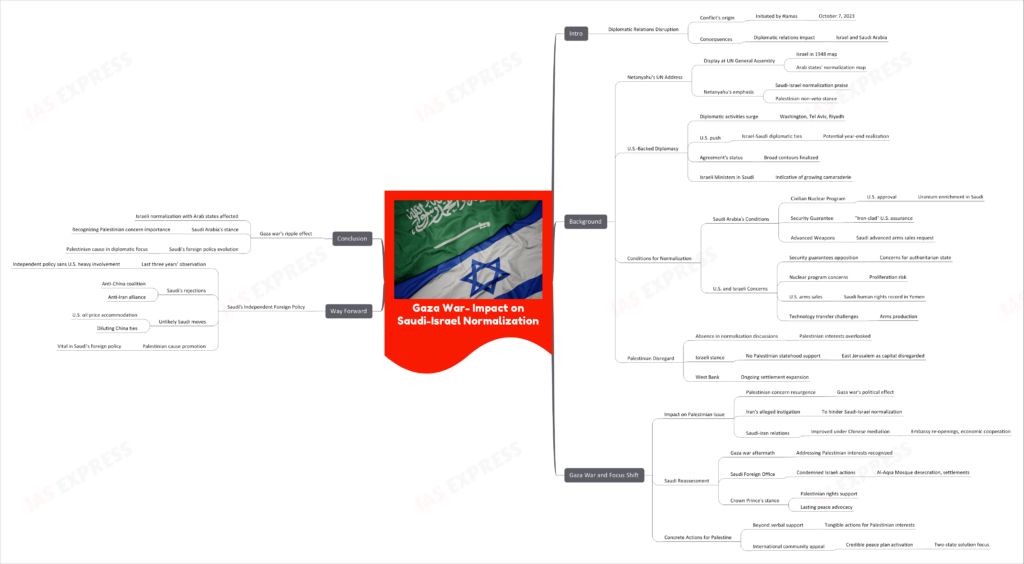Gaza War- What is its impact on the Saudi-Israel Normalization?
From Current Affairs Notes for UPSC » Editorials & In-depths » This topic
IAS EXPRESS Vs UPSC Prelims 2024: 85+ questions reflected
The Gaza war, initiated by Hamas on October 7, 2023, has had far-reaching consequences, particularly on the diplomatic relations between Israel and Saudi Arabia. This conflict has disrupted Israeli efforts, supported by the United States, to normalize relations with Arab states without addressing Palestinian concerns.

Background
Netanyahu’s UN Address
- On September 22, Israeli Prime Minister Benjamin Netanyahu showcased maps at the United Nations General Assembly.
- One map depicted Israel in 1948, while the other highlighted Arab states that had normalized relations with Israel.
- Netanyahu specifically praised the normalization process with Saudi Arabia and emphasized that the Palestinians should not have veto power over this process.
U.S.-Backed Diplomacy
- There has been a flurry of diplomatic activities between Washington, Tel Aviv, and Riyadh.
- The U.S. has been pushing for diplomatic relations between Israel and Saudi Arabia, possibly to be realized within the year.
- American and Israeli officials have publicly stated that the broad contours of the agreement have been finalized.
- Two Israeli Ministers even visited Saudi Arabia for international conferences, indicating a growing camaraderie between the two nations.
Conditions for Normalization
Saudi Arabia’s Conditions
Saudi Arabia had three conditions for normalizing relations with Israel:
- Civilian Nuclear Program: Saudi Arabia sought U.S. approval for a civilian nuclear program that allows uranium enrichment within the country.
- Security Guarantee: An “iron-clad” U.S. security guarantee was requested by Saudi Arabia.
- Advanced Weapons: Saudi Arabia sought sales of advanced weapons.
U.S. and Israeli Concerns
- Some U.S. politicians opposed providing security guarantees to an authoritarian state.
- Concerns were raised about Saudi Arabia developing its own nuclear program, considering the proliferation risk.
- The issue of U.S. arms sales was complicated by Saudi Arabia’s human rights record, particularly in Yemen.
- Saudi insistence on technology transfer for arms production also posed challenges.
Palestinian Disregard
- Palestinian interests were not a focal point in the normalization discussions.
- Israel, under Netanyahu’s leadership, showed no willingness to support Palestinian aspirations for statehood or acknowledge East Jerusalem as the capital of a Palestinian state.
- Settlement expansion in the West Bank continued without concessions.
Gaza War and Shift in Focus
Impact on Palestinian Issue
- The Gaza war has once again brought the Palestinian issue to the forefront of West Asian politics.
- Some have alleged that Iran instigated the Hamas attacks to hinder Saudi Arabia’s normalization efforts with Israel.
- However, Saudi-Iran relations have already improved under Chinese mediation, including embassy re-openings and economic cooperation.
Saudi Reassessment
- Following the Hamas attacks, Saudi Arabia recognized the necessity of addressing Palestinian interests for regional peace and stability.
- The Saudi Foreign Office condemned Israeli abuses, including desecration of the Al-Aqsa Mosque and settlement expansion.
- Crown Prince Mohammed bin Salman asserted support for Palestinian rights and lasting peace.
Concrete Actions for Palestine
- Saudi Arabia has moved beyond verbal assurances to the Palestinians, focusing on tangible actions to serve Palestinian interests.
- The international community is called upon to activate a credible peace plan enabling a two-state solution.
Way Forward
- Over the past three years, Saudi Arabia has pursued its foreign policy independently, without strong U.S. involvement.
- The kingdom rejects U.S. efforts to build an anti-China coalition and an anti-Iran alliance.
- Saudi Arabia is unlikely to accommodate the U.S. on oil prices or dilute its strategic ties with China.
- Promoting the Palestinian cause will become a vital component of Saudi Arabia’s foreign policy approach.
Conclusion
The Gaza war has disrupted Israel’s efforts to normalize relations with Arab states, particularly Saudi Arabia. Saudi Arabia has recognized the importance of addressing Palestinian concerns for regional stability. As Saudi Arabia asserts its foreign policy autonomy and diversifies its global ties, supporting the Palestinian cause will play a significant role in its diplomatic endeavors.
Practice Question for Mains
How would the Gaza War impact the ongoing attempts at Saudi-Israel normalization? What is the way forward? (250 words)
If you like this post, please share your feedback in the comments section below so that we will upload more posts like this.

